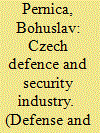| Srl | Item |
| 1 |
ID:
171650


|
|
|
|
|
| Summary/Abstract |
The paper summarises the evolution of the iron triangle of the mutual relationships amongst the ministry of defence, defence industry, and the political elite in the post-communist Czech Republic in 1990-2020. The essay stresses the oddness of this relationship. On the one hand, the government is bound by a partnership to the Defence and Security Industry Association of the Czech Republic (DSIA), a lobbying group of more than 100 organisations that conduct business in defence and security sector in Czechia. Yet, since its creation in 2000, this assemblage of industries within DSIA's market position is falling, in fact. Neither political parties in power, nor the governments have been able to support national defence industry through the small military. Just a few DSIA national members are able to compete internationally with their cutting-edge products. Others have evolved into middlemen trading intime-expired Czechoslovak equipment retired from the Czech Armed Forces.
|
|
|
|
|
|
|
|
|
|
|
|
|
|
|
|
| 2 |
ID:
178657


|
|
|
|
|
| Summary/Abstract |
In this paper we argue that free riding within NATO should be assessed from a microeconomic point of view. In particular, nations with a communist background should be appraised in a much broader perspective than the 2% GDP spending target, or number of soldiers on deployment. In comparison with post-Soviet countries such as Lithuania, wealthy post-communist country such as Czechia where defence institution experienced an extensive militarisation of society and economy in the Soviet style, continues to fail in reducing their military-administrative complexes, as well as maintaining an excessive structure of militarised civilian activities; e.g., sport clubs, folkloric choirs, medical and educational facilities, established for purpose of autonomy from civil society. Hence, increasing defence spending to 2% GDP can have the effect of strengthening this structure when weak defence institutions are not able to manage their entire defence budget to achieve military modernisation, as has happened in Czechia.
|
|
|
|
|
|
|
|
|
|
|
|
|
|
|
|